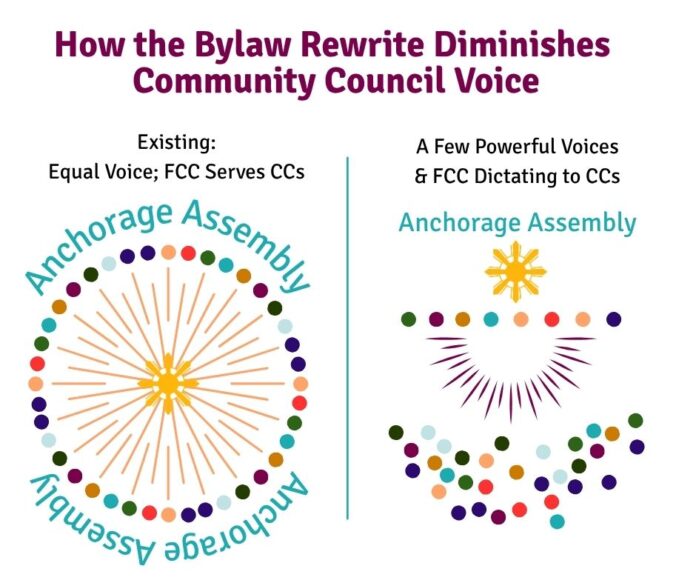An attempted rewrite of bylaws by the Federation of Community Councils (FCC) has raised alarm for Community Councils throughout Anchorage.
From No Members to Membership-Based
The contention centers around the proposed rewrite’s restructuring of the federation into a membership-based organization with a Board of Directors. Since its original adoption in 1976, the federation’s bylaws maintain, “there shall be no members of the Corporation.” The new proposed bylaws allow 37 members (one member from each Community Council) who will then elect a Board of Directors comprised of 7-11 members.
The Roles of CCs and the FCC
Community Councils (CCs) play a large role in shaping local politics. They were formed to give ordinary citizens, property owners, business owners, and nonprofits in Anchorage a voice in the local political arena. The Community Councils’ purpose is to “provide a direct and continuing means of participating in the government process and local affairs” as well as advise the Assembly, the Mayor, and local administration.
In the Amended Articles of Incorporation (2005), the FCC was not granted the power to decide its own mission, but rather to “represent the community councils recognized by the Municipality of Anchorage under the Municipal Community Council Ordinance.” Delegates from each Community Council meet regularly to direct FCC activities; the FCC is not to direct the CCs.
Anchorage Residents Voice Concerns
Zack Gottshall, Vice President of the Taku/Campbell Community Council, sees the bylaw rewrite as a “power grab in plain sight,” and has prompted pushback on the FCC Bylaw Committee. According to FAQs published by the FCC Bylaw Committee: “Nothing in the proposed FCC bylaws changes Community Councils or requires them to change in any way.” However, the rewrite substantially alters the way the federation is managed, and the power CC’s have over that management.
Concerned Anchorage resident Amanda Thompson recognizes community councils as important tools for citizen-governance and has followed the issue closely. One of her concerns pertains to the unannounced presence of Foraker CEO Laurie Wolfe at the Special Meeting held on October 29. Foraker is an Alaskan non-profit that “stands beside Alaska’s nonprofit professionals, working with them to build effective, strategic, and sustainable organizations.”
Amanda says she saw this same strategy used to restructure Anchorage as a whole: “The Assembly seemed to have an agenda to consolidate power with hierarchy. A couple millions of dollars spent on hiring consultants, telling assemblymembers how to reorganize and restructure things in the city.”
Although consolidation of power may allow increased efficiency, it also decreases accountability, oversight, and plurality of opinion. The FCC was structured to be governed by the Community Councils. Many Anchorage residents perceive the bylaw changes as FCC’s attempt to wrest power away from Community Councils.
